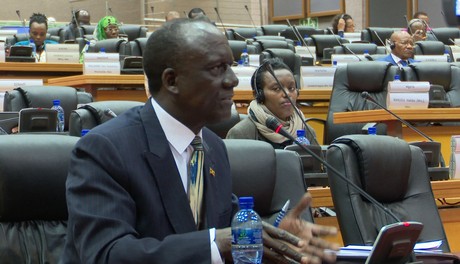
The Chairman of the Peace and Security Council of the African Union, Amb. Mull Katende, has said heavy reliance on donor funding was affecting peace efforts on the continent.
“Our major challenge is donor dependence, and this defeats the whole idea of African solutions to African problems,” Katende said adding that “the decision by the EU to reduce funding for AMISOM troops’ allowances by 20 percent, was having a negative impact on troop morale and instead boosting the resolve of Al Shabaab to continue undermining the AMISOM gains.”
Presenting a paper on the status of peace and security in Africa to Pan African Parliament MPs on Thursday, Amb. Katende urged parliamentarians to make use of the available tools for structural conflict prevention by ensuring that African governments are more transparent, accountable and responsive to the legitimate demands of the people.
The African legislators who are meeting in Midrand, South Africa were told that African people yearn for peace, security and prosperity.
Presently, there is conflict and instability in South Sudan, Somalia, Mali and the Sahel, Libya, Burundi, Sudan, Djibouti, the Gulf of Guinea, Gambia and Western Sahara among others.
Katende hopes that the implementation of the funding formula adopted by the AU in the July 2016 Summit held in Kigali, Rwanda, would improve the funding challenges.
Reacting to the report, legislators urged the Peace and Security Council of the AU to address the root causes of conflict in Africa and the supply of arms. They said economic, social and political inclusiveness was key to peace.
Prof. Morris Ogenga Latigo noted that the challenge that Africa faces is providing leadership for posterity rather than for self, corruption and self-interest.
“We should invest more in ensuring that elections are free; not repetitive but free of mischief and when you are in governance, you govern for all the country and the continent,” he said.
Mbaydoum Simeon of the Central African Republic said African states are victims of raw materials that they possess. He noted that despite more than 12,000 Blue Helmets in CAR, the security situation had not been resolved.
Honourable Okot Ogong (Uganda) was dismayed to note that PAP was talking about security and peace and yet the continent had no stand-by force to manage its own security challenges.
“In the DRC, Darfur and other conflict areas, it is the UN keeping the peace. The AU is acting on behalf of UN Security Council. We have therefore left the agenda of Africa in the hands of other people,” he said.
Other legislators opined that Africa’s target of silencing the guns by 2020 cannot be guaranteed in an atmosphere of intolerance and oppression of the minority.
“African politics has now become a business of patronage and cronyism. We have become more tribalistic and intolerant of each other’s religion,” said Mohammed Mubarak Muntaka from Ghana.
PAP President, Roger Nkodo, said the solutions to the problems bedeviling Africa lay in the Malabo Protocol and that without full powers of legislation, African voices cannot be heard.
With the myriad of challenges facing the continent in securing peace, the Peace and Security Council of the AU has now focused its energies to fight hate crimes and the ideology of genocide in Africa and strengthening the AU’s early warning systems before states slide into anarchy.
The fourth ordinary session of the Pan African Parliament is meeting in its headquarters in Midrand, South Africa, from 8th – 19th May 2017.
Uganda’s delegation to the PAP includes Hon. Jacqueline Amongin (NRM, Ngora), also leader of the delegation; Prof. Morris Ogenga-Latigo (FDC, Agago North); Hon. Anifa Bangirana Kawooya (NRM, Sembabule); Hon. Felix Okot Ogong (NRM, Dokolo South) and Hon. Babirye Kadogo (Ind. Buyende).
